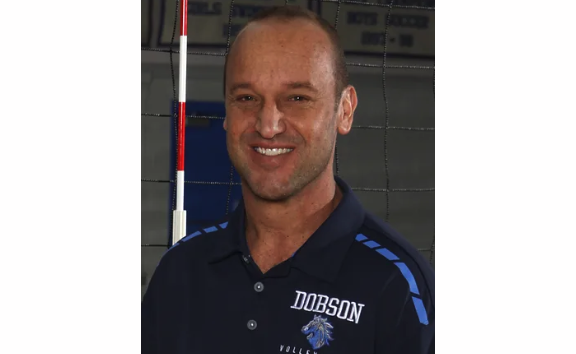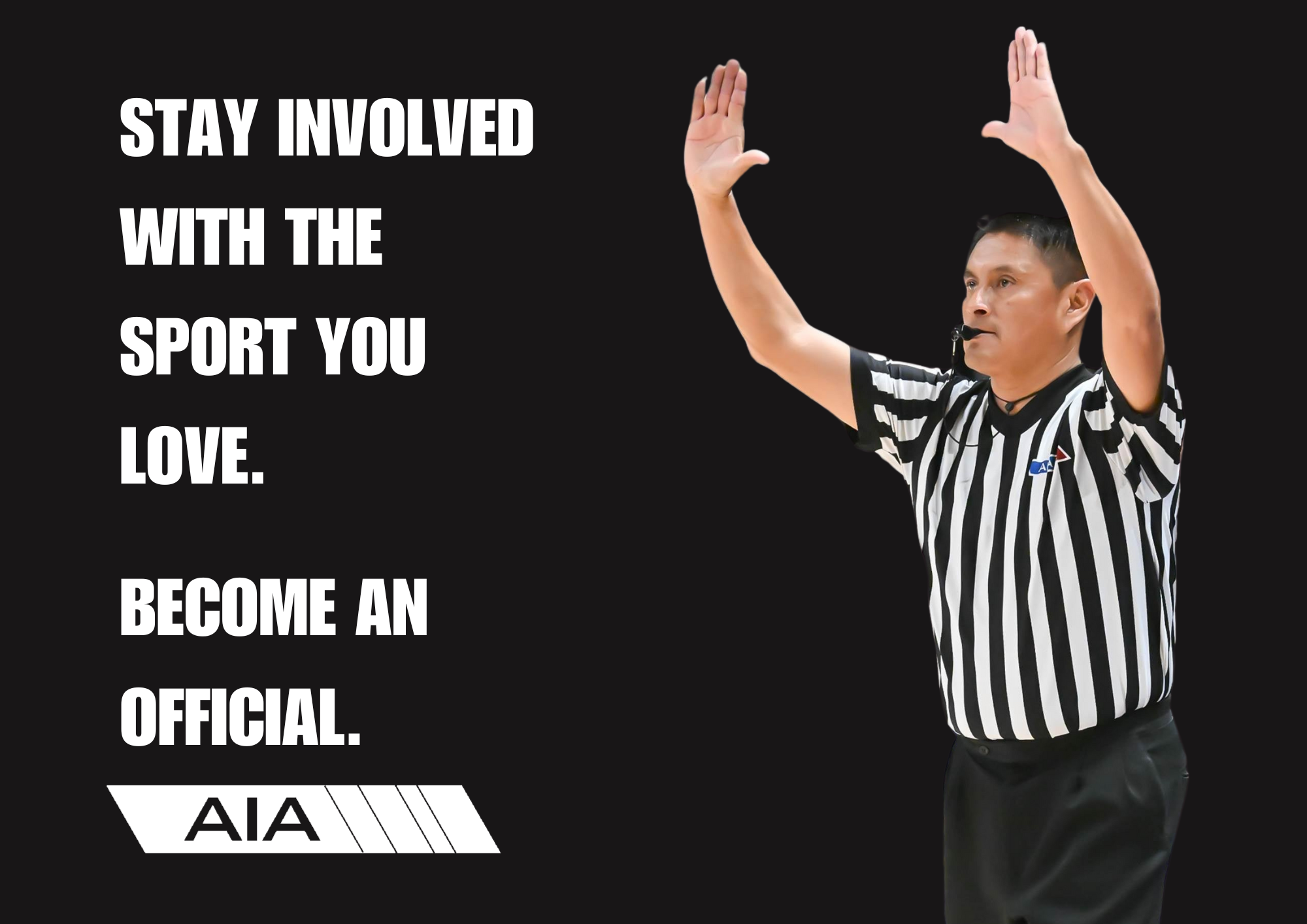Dobson VB head coach Van Wicklin's unique approach to anxiety in sports
February 6, 2023 by Sean Brennan, Arizona State University

Sean Brennan is an ASU Cronkite School of Journalism student assigned to cover Dobson High School for AZPreps365.com.
Before holding his first practice as the head coach of Dobson High School girls’ volleyball team, Jim Van Wicklin did something a bit unconventional.
He divided a whiteboard in the gym into three sections based on the level of anxiety each one of his players was feeling at the moment.
The first section, labeled “green,” meant that a player was feeling absolutely no anxiety.
Next to that was the “yellow” section, signifying that a player was beginning to question their abilities.
Sitting at the other end of the board was the “red” section. If a player put their name onto this portion of the board, they are completely doubting their skills and are in their own head.
When the players arrived to the gym, they were asked to write their name in whatever section best fit their mental state.
“There’s a million reasons why they’re coming into practice not ‘green,’” Van Wicklin said. “So the goal was, how do I make them leave ‘green’ every day? Can I create practices that are fun and happy, and make them [the players] better?”
While Van Wicklin initially received some puzzled looks from his new players, the Mustangs soon came to greatly appreciate the daily pre-practice exercise.
“It helps us because you knew where everyone was that day,” senior libero Kelsi Dieu said. “And so if someone was on a yellow or in the red, I would go out of my way to make them feel better and push them to either yellow or green.”
Most coaches would normally kick off a practice by explaining drills or talking strategy. But the Mustangs’ bench boss sets aside time to make sure he knows how his team is feeling, because the life of a high school student is usually accompanied by stress.
According to a 2019 study conducted by the Pew Research Center, 70% of teen respondents said that anxiety and depression is a major problem among their peers, while 26% said it was only a minor issue.
Van Wicklin’s coaching approach partially developed through his experience with his own son, Cross, who was around 15 years old when the COVID-19 pandemic struck in 2020. When classrooms turned into webinars, Van Wicklin recalled becoming focused on preventing his son from struggling.
However, it struck Van Wicklin that being a ‘helicopter parent’ – a term defined by the Merriam-Webster Dictionary as a parent who is too heavily involved in their child’s life – was actually more hurtful than helpful. This style of parenting is even more detrimental when a young athlete is playing a sport such as volleyball, as there’s nothing the parents can do to change the result on the court.
“When a kid is sitting on a volleyball court playing for a top 10 spot, you [a parent] can’t do anything for your kid,” Van Wicklin said. “You can yell at the ref, you can yell at the coach, you do all this other stuff, but it doesn’t change a thing. Those kids still need to learn how to handle anxiety, because that’s going to be there no matter what.”
Van Wicklin started researching anxiety in athletes is because a volleyball team he coached two years ago was immensely talented, but struggled to handle the stress they felt whenever they were in a close match.
“They would just collapse,” Van Wicklin said. “I tried to be nice, I tried to scream and yell, and I tried everything you could imagine. And nothing worked. I haven’t trained them for this. I haven’t trained them for, ‘You’re about to serve game point, the team's going to lose if you miss.’”
It was at that moment that Van Wicklin knew he needed to find ways to help his players cope with stressful scenarios. The coach’s original goal was to make athletes’ stress completely go away. However, he soon realized that plan wasn’t feasible, and quickly shifted his sights to a more attainable goal.
Meeting Mathew Anderson (better known as Mathew Blades), a former radio personality of 27 years who now coaches youth hockey – and coached the hockey team Cross played on – helped Van Wicklin with his research. Anderson founded Learn From People Who Lived It, a weekly podcast focused on mental health. He also currently works alongside former professional hockey player Lyndsey Fry to teach athletes how to manage their stress.
Much like Van Wicklin, Anderson’s personal experiences played an instrumental role in his focus on stress and anxiety in sports.
Since his early 20s, Anderson was focused on his career and family, and was subconsciously tiring himself out. In 2017, the turmoil of Anderson’s career finally took a physical toll: a herniated disk and a pinched nerve eventually required emergency surgery.
“I think the culmination of me going through my own mental wellness struggles, and then ultimately coming out the other side, combined with the fact that now I’m working with teenage athletes on the daily,” Anderson said. “It just prompted me to really want to lean into that.”
Thanks in part to Anderson and Fry’s work, Van Wicklin’s new objective became helping his athletes’ anxiety by having an understanding of their current mental states. Knowing how each player is feeling before a practice is crucial for a coach, especially because athletes constantly shift between the “green,” “yellow” and “red” mental states over the course of a game.
“You’re going to bob and weave throughout the sequence of the entire match, and you should,” Anderson said. “But the key is that a lot of us get stuck when we get into the ‘red.’ We don’t know how to get back into the ‘green,’ and then, as I tell people all the time, some of us get lost in that ‘yellow’ land.”
Although Van Wicklin picked up the green/yellow/red concept from Anderson, the coach put his own little twist on the exercise. Throughout the Mustangs’ practices, if a player’s mental state improves, they are encouraged to move their name to the corresponding section. The player then puts a star next to the teammate’s name which helped their anxiety improve.
“You just look at the face of the person who helped the other person get out of their anxiety-driven situation,” Van Wicklin said. “[They] smile, because they knew they were part of the reason that this person had moved to a higher level.”
While living with anxiety has no easy remedy, Van Wicklin has found a way to help his athletes embrace stress rather than trying to eliminate it. And a big reason why he – along with people such as Anderson and Fry – continue to research this issue is to ultimately make sports an escape from athletes’ otherwise stressful lives.
“All I want is the sport to be healthier, I want it to be a healthy outlet for girls,” Van Wicklin said. “I want them to leave all the crap they have in life, school and everything else and be able to walk into the gym, get on the court, and go,‘This is going to be fun.’”
In reality, finding methods for athletes to live with stress will likely be a lifelong journey for Dobson’s head coach. However, it seems he’s making some good progress, as many of the Mustangs’ players have already became more comfortable on the court.
“He [Van Wicklin] is like,‘If you fail, you learn it,’” Dieu said. “So it's okay for us to mess up on the court because he's not going to get upset... We're making steps into improving, [and] failure helps you improve.”
To learn more about the Learn From People Who Lived It podcast, visit https://www.learnfrompeoplewholivedit.com/


